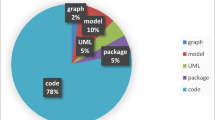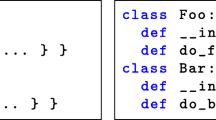Abstract
When a developer pushes a change to an application’s codebase, a good practice is to have a test case specifying this behavioral change. Thanks to continuous integration (CI), the test is run on subsequent commits to check that they do no introduce a regression for that behavior. In this paper, we propose an approach that detects behavioral changes in commits. As input, it takes a program, its test suite, and a commit. Its output is a set of test methods that capture the behavioral difference between the pre-commit and post-commit versions of the program. We call our approach DCI (Detecting behavioral changes in CI). It works by generating variations of the existing test cases through (i) assertion amplification and (ii) a search-based exploration of the input space. We evaluate our approach on a curated set of 60 commits from 6 open source Java projects. To our knowledge, this is the first ever curated dataset of real-world behavioral changes. Our evaluation shows that DCI is able to generate test methods that detect behavioral changes. Our approach is fully automated and can be integrated into current development processes. The main limitations are that it targets unit tests and works on a relatively small fraction of commits. More specifically, DCI works on commits that have a unit test that already executes the modified code. In practice, from our benchmark projects, we found 15.29% of commits to meet the conditions required by DCI.


















Similar content being viewed by others
Notes
by default, nb = 3
We are aware that behavioral changes can be introduced in other ways, such as modifying dependencies or configuration files (Hilton et al. 2018).
For a side-by-side comparison, see https://danglotb.github.io/resources/dci/index.html
Interestingly, the number is parsed lazily, only when needed. Consequently, the exception is thrown when invoking the longValue() method and not when invoking parse()
References
Anand S, Pasareanu CS, Visser W (2007) Jpf-se: A symbolic execution extension to java pathfinder 03
Böhme M, Roychoudhury A (2014) Corebench: Studying complexity of regression errors. In: Proceedings of the 2014 International Symposium on Software Testing and Analysis. ACM, pp 105–115
Cadar C, Dunbar D, Engler D (2008) Klee: Unassisted and automatic generation of high-coverage tests for complex systems programs. In: Proceedings of the 8th USENIX Conference on Operating Systems Design and Implementation, OSDI’08. USENIX Association, Berkeley, pp 209–224
Campos J, Arcuri A, Fraser G, Abreu R (2014) Continuous test generation: Enhancing continuous integration with automated test generation. In: Proceedings of the 29th ACM/IEEE International Conference on Automated Software Engineering, ASE ’14. ACM, pp 55–66
Danglot B, Vera-Pérez OL, Baudry B, Monperrus M (2019) Automatic test improvement with dspot: a study with ten mature open-source projects. Empirical Software Engineering
Daniel B, Jagannath V, Dig D, Marinov D (2009) Reassert: Suggesting repairs for broken unit tests. In: 2009 IEEE/ACM International conference on automated software engineering, pp 433–444
Duvall PM, Matyas S, Glover A (2007) Continuous integration: improving software quality and reducing risk. Pearson Education
Evans RB, Savoia A (2007) Differential testing: a new approach to change detection. In: The 6th joint meeting on european software engineering conference and the ACM SIGSOFT symposium on the foundations of software engineering: Companion papers. ACM, pp 549–552
Falleri J-R, Morandat F, Blanc X, Martinez M, Monperrus M (2014) Fine-grained and Accurate Source Code Differencing. In: Proceedings of the International Conference on Automated Software Engineering, pp 313–324
Fowler M, Foemmel M (2006) Continuous integration. Thought-Works https://www.thoughtworks.com/continuous-integration, pp 122:14
Fraser G, Arcuri A (2012) The seed is strong: Seeding strategies in search-based software testing. In: 2012 IEEE fifth international conference on Software testing, verification and validation (ICST). IEEE, pp 121–130
Godefroid P, Klarlund N, Sen K (2005) Dart: directed automated random testing. In: ACM Sigplan notices. ACM, vol 40, pp 213–223
Groce A, Holzmann G, Joshi R (2007) Randomized differential testing as a prelude to formal verification. In: Proceedings of the 29th international conference on Software Engineering. IEEE Computer Society, pp 621–631
Hilton M, Tunnell T, Huang K, Marinov D, Dig D (2016) Usage, costs, and benefits of continuous integration in open-source projects. In: Proceedings of the 31st IEEE/ACM International Conference on Automated Software Engineering, ASE 2016 .ACM, New York, pp 426–437
Hilton M, Bell J, Marinov D (2018) A large-scale study of test coverage evolution. In: Proceedings of the 33rd ACM/IEEE International Conference on Automated Software Engineering, ASE 2018. ACM, New York, pp 53–63
Jin W, Orso A, Xie T (2010) Automated behavioral regression testing. In: 2010 Third international conference on software testing, verification and validation, pp 137–146
Kuchta T, Palikareva H, Cadar C (2018) Shadow symbolic execution for testing software patches. ACM Trans Softw Eng Methodol 27(3):10:1–10:32
Lahiri S, McMillan K, Hawblitzel C (2013) Differential assertion checking. Technical report
Madeiral F, Urli S, Maia M, Monperrus M (2019) Bears An Extensible Java Bug Benchmark for Automatic Program Repair Studies. In: Proceedings of the 26th IEEE International Conference on Software Analysis, Evolution and Reengineering (SANER ’19)
Marinescu PD, Cadar C (2013) KATCH: high-coverage testing of software patches. ACM Press, pp 235
Menarini M, Yan Y, Griswold WG (2017) Semantics-assisted code review: an efficient tool chain and a user study. In: 2017 32Nd IEEE/ACM international conference on automated software engineering (ASE), pp 554–565
Noller Y, Nguyen HL, Tang M, Kehrer T (2018) Shadow symbolic execution with java pathfinder. SIGSOFT Softw. Eng. Notes 42(4):1–5
Palikareva H, Kuchta T, Cadar C (2016) Shadow of a doubt: testing for divergences between software versions. In: Proceedings of the 38th International Conference on Software Engineering. ACM, pp 1181–1192
Person S, Dwyer MB, Elbaum S, Pǎsǎreanu CS (2008) Differential symbolic execution. In: sProceedings of the 16th ACM SIGSOFT International Symposium on Foundations of Software Engineering, SIGSOFT ’08/FSE-16. ACM, New York, pp 226–237, NY
Saff D, Ernst MD (2004) An experimental evaluation of continuous testing during development. In: ACM SIGSOFT Software engineering notes. ACM, vol 29, pp 76–85
Spieker H, Gotlieb A, Marijan D, Mossige M (2017) Reinforcement learning for automatic test case prioritization and selection in continuous integration. In: Proceedings of the 26th ACM SIGSOFT International Symposium on Software Testing and Analysis, ISSTA 2017. ACM, New York, pp 12–22
Taneja K, Xie T (2008) Diffgen: Automated regression unit-test generation. In: Proceedings of the 2008 23rd IEEE/ACM International Conference on Automated Software Engineering, ASE ’08. IEEE Computer Society, Washington, pp 407–410
Tonella P (2004) Evolutionary testing of classes. In: Proceedings of the 2004 ACM SIGSOFT International Symposium on Software Testing and Analysis, ISSTA ’04. ACM, New York, pp 119–128
Urli S, Yu Z, Seinturier L, Monperrus M (2018) How to Design a Program Repair Bot? Insights from the Repairnator Project. In: ICSE 2018 - 40Th international conference on software engineering, track software engineering in practice (SEIP), pp 1–10
Vera-Pérez OL, Danglot B, Monperrus M, Baudry B (2018) A comprehensive study of pseudo-tested methods. Empirical Software Engineering
Voas JM, Miller KW (1995) Software testability: the new verification. IEEE Softw 12(3):17–28
Waller J, Ehmke NC, Hasselbring W (2015) Including performance benchmarks into continuous integration to enable devops. SIGSOFT Softw Eng Notes 40(2):1–4
Xie T (2006) Augmenting automatically generated unit-test suites with regression oracle checking. In: Thomas D (ed) ECOOP 2006 – Object-Oriented Programming. Springer, Berlin, pp 380–403
Yang G, Khurshid S, Person S, Rungta N (2014) Property differencing for incremental checking. In: Proceedings of the 36th International Conference on Software Engineering, ICSE 2014. ACM, New York, pp 1059–1070
Yoo S, Harman M (2012) Test data regeneration: Generating new test data from existing test data. Softw Test Verif Reliab 22(3):171–201
Zampetti F, Scalabrino S, Oliveto R, Canfora G, Penta MD (2017) How open source projects use static code analysis tools in continuous integration pipelines. In: 2017 IEEE/ACM 14Th international conference on mining software repositories (MSR), pp 334–344
Zhang P, Elbaum S (2012) Amplifying tests to validate exception handling code. In: Proc. of int. Conf. on software engineering (ICSE). IEEE Press, pp 595–605
Author information
Authors and Affiliations
Corresponding author
Additional information
Communicated by: Tao Yue
Publisher’s note
Springer Nature remains neutral with regard to jurisdictional claims in published maps and institutional affiliations.
Rights and permissions
About this article
Cite this article
Danglot, B., Monperrus, M., Rudametkin, W. et al. An approach and benchmark to detect behavioral changes of commits in continuous integration. Empir Software Eng 25, 2379–2415 (2020). https://doi.org/10.1007/s10664-019-09794-7
Published:
Issue Date:
DOI: https://doi.org/10.1007/s10664-019-09794-7




